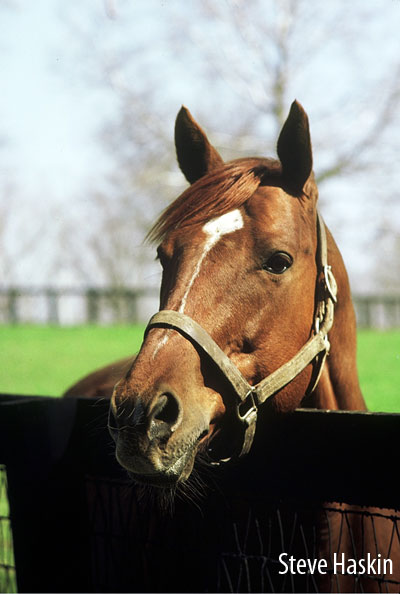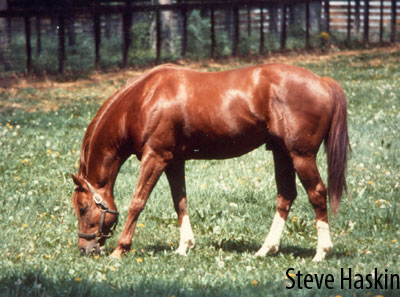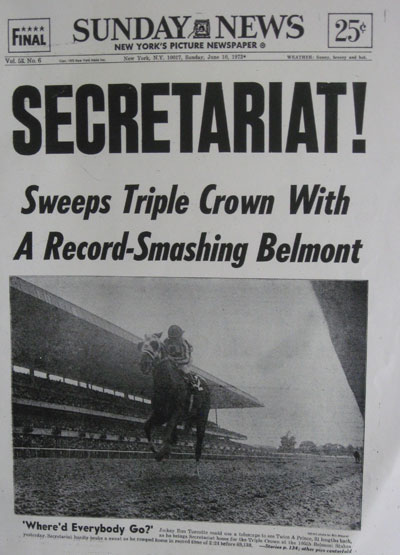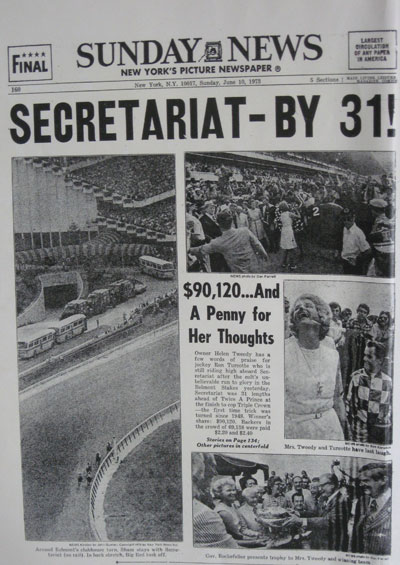(This article originally appeared in the Blood-Horse magazine in 2002)
In the spring of 1969, a magical seed was planted in the equine garden known as The Meadow, located in Caroline County, Va., just north of Richmond. From that seed the following spring would sprout a legendary creature who would one day transcend the Sport of Kings and forever alter the course of racing history.
But the harsh winds of 30 winters have since eroded this hallowed ground that once nurtured the immortal Secretariat. The pastures and training track that once shook from the pounding of "Big Red's" mighty hooves have been still for two decades.
Only 400 of the farm's original 2,000 acres are as they were then. The training track and adjoining barns have remained somewhat intact, but are decaying with every passing year. There are no longer horses frolicking about or even photographs on an office wall to keep the memories alive. All that remains in Caroline County to remind one of The Meadow's illustrious past are the aging, but still-fertile, minds of several former grooms, to whom those glory days of the 1950s, '60s, and '70s have all but faded from their minds. They have moved on with their lives--two work full-time as janitors, two have retired, and one dabbles as a handyman, occasionally doing lawn work and fixing small engines and lawn mowers.
Charlie Ross, 66, passes The Meadow every day to and from his job at the All American Truck Plaza, just off Interstate 95, directly across from King's Dominion amusement park. Ross has been employed there as a janitor for the past eight years. For someone who worked at The Meadow for 37 years, taking care of some of the best-bred yearlings in the country, Ross admits, “It was strange at first going from the horses to cleaning showers.”
One of the yearlings who was turned over to him in the early spring of 1971 was a powerful chestnut colt by Bold Ruler, out of Somethingroyal, who had already been given the name Secretariat.
Ross spent nearly a year grooming Secretariat, watching him trim off pounds of baby fat and develop into a racehorse and eventually into a legend. But the big chestnut with the three white legs and long, elegant strip of white running down his face was but one of many horses to pass Ross' way. Although he does admit to feeling good about his role in Secretariat's life, in the world of Charlie Ross, there is not much room for sentimentality. His only personal link to Secretariat these days is a copy of Ray Woolfe Jr.'s book, which tells Big Red's story in text and photos. Any other pieces of memorabilia collected over the years are long gone.
On the afternoon of Dec. 20, 2001, Ross left work at the usual time of 3 o'clock, got into his 1999 metallic blue Toyota pickup, and headed west on two-lane Route 30 toward his home on nearby Sadie Lane. But today was different. Instead of driving past the dirt road entrance of The Meadow's old training complex, Ross hung a right and drove along the outside of the track to an opening in the rail. On the other side of the track was the indoor training barn and the European-style stable area, with the three outdoor barns forming three sides of a square. The fourth side, completing the square, was a large open shed, in which still stood the old hotwalking machine.
Ross looked at the peeling paint of the training barn that was now more gray than white and just shook his head. "It's been a lot of years since I've been here," he said. "It feels strange to be back. There was a time when I used to be here more than I was at home. There sure was no paint peeling off back then like it is now. We used to paint it every year. This was a beautiful place to work, and Mr. (Christopher) Chenery was a wonderful man to work for. So was Mrs. Tweedy (Chenery's daughter Penny, who took over the farm after her father's death in 1972)."
Ross, who has a noticeable limp due to arthritis, walked alongside one of the barns, passing one stall after another. When he came to the end, he unhooked the top door of the first stall and said, as if he were unveiling a priceless work of art, "This was Secretariat's stall." Inside, several of the ceiling boards had come loose and were split and rotted. In the back left corner hung a veil of cobwebs, and in the front left corner stood an old broom.
Ross just stared inside, then took a few steps forward and rested his arms atop the bottom stall door. Although he said nothing, one couldn't help but imagine the flood of memories that were rushing through his mind. "See these two holes," he said, pointing to a pair of nail holes in the open top door. "This is where I hung the plaque that read: 'Secretariat, by Bold Ruler out of Somethingroyal.' Yeeeaaah, it does bring back memories. I remember when I used to stand outside this stall in the sunshine, just as I am now.
"I got Secretariat in the spring, along with five other yearlings, and I remember liking him when I first saw him. He was built real strong, and because he was so big and powerful, it took him a while to get it together. He was a very quiet horse to work with and I didn't have any problems with him. He had no bad habits; no biting, no kicking or anything like that. Meredith Bailes used to ride him a lot and he thought he might be something, but he really never showed anything to make us believe he was gonna become such a great horse."
Ross recalled going to the Preakness on a rented bus with other farm employees. He also attended the Belmont Stakes with his wife, but was blocked by the huge crowd and had to watch the historic event on a TV monitor in the clubhouse.
As Ross returned to his truck, he seemed to be engulfed by the quiet, as the only sound came from the winter winds howling through the naked tree limbs. "Yeah, I made a lot of tracks around this old place," he said. "But there's nothin' around here no more. It's really sad. I still think about Secretariat now and then, especially when I watch the races on television. But I have another job now, and as long as I'm working, I'm happy."
Just up the road from Ross' house is the home of 66-year-old Bannie Mines, who along with Howard Gregory and Lewis Tillman, took care of Secretariat when he was a foal and weanling. Tillman died several years ago, but Mines and Gregory are still going strong. Mines lives in a small house on Riva Ridge Road with his daughter and grandson, for whom he babysits while his daughter is at work. A few doors down lives Raymond "Peter Blue" Goodall, who was Riva Ridge's groom when he was a yearling.
Gregory lives several minutes away, across Route 30, on Gregory Road. One of his neighbors is 74-year-old Wilbur "Bill" Street, who spent most of his time at the track, but did team up with his brother Harry to van Secretariat from the farm to Hialeah in January of 1972 to start his racing career.
Mines says he doesn't do much else other than some yard work and watching television. Gregory, although 76, is still sharp and loves to keep busy, mowing lawns, doing a little landscaping, and fixing engines.
Gregory worked at The Meadow for 31 years and another several years after Penny Chenery sold the farm. Of the next two owners of The Meadow, also known as Meadow Farm, one went bankrupt and the other went to prison. The current owner tore down the original house and built a new one across the road from the old training complex.
Gregory was around Secretariat from the day he was born, which was March 30, 1970, at 10 minutes past midnight. Dr. Olive Britt, The Meadow's veterinarian who still practices part-time at age 83, remembers getting a call from the nightwatchman, telling her that Somethingroyal was in the middle of foaling. By the time she arrived, Somethingroyal had already given birth. Britt, who now lives in nearby Goochland County, said she'll never forget farm manager Howard Gentry watching the foal get to his feet and saying, "This is what we've been waiting for for 35 years."
Gregory could tell right away the colt was something special. "We knew from the get-go he was different from any horse we ever had," he said. "There was definitely something there. I remember him being very alert, and he'd test you. When you walked him to the paddock your mind and his had to correspond. If he thought you weren't paying attention he was gone. You had to have your mind focused on him at all times. I also worked with Riva Ridge and he was an altogether different horse. He was so quiet, and all you had to do was say, 'Whoa, Riva,' and he'd just stop and stand there. But Secretariat would try you in a heartbeat. You had to know what you were doing, because he always knew when you had him and when you didn't. And if he knew you didn't, that was it; he was gone.
"He was a gorgeous colt, with a beautiful head, and those three white stockings. I'll never forget watching the Belmont Stakes on TV. Lord, that was something to see. I'm very proud to have been around a horse like that. I remember putting his mother, Somethingroyal, in the ground after she died at age 31. I also buried Hill Prince. Those were really special days back then, and you couldn't work for anyone nicer than Mr. Chenery. Money was never a problem, and we got bonuses and shares in winnings. I was available anytime they needed me, because I loved what I was doing and where I was working. When I wanted to build my own house, they helped me out. And because of Mr. Chenery, I live in a six-room house on five acres, and it's all mine. There aren't many people out there like Mr. Chenery anymore.
"I stayed on after Mrs. Tweedy sold the farm, but the last fellow I worked for, Mr. (Eric) Friedlander, couldn't pay us, so I left. I drive by the farm most every day, shopping and doing errands, but I go right by. I haven't been back since the day I left. It hurts me too bad to see what's become of it. I've had several jobs since, but I'm pretty much retired now. I thank God I'm still around to do whatever I want to. I couldn't ask for more than that."
Gregory, like Ross, has little in the way of memorabilia from the old days, and no longer sees much of his fellow workers. "I used to have all kinds of stuff, but where they are I couldn't put my finger on it," he said. "It's been so long. I very seldom get a chance to visit with the other guys. Everybody's pretty much gone on their own now. Every once in a while I run acrosss one of 'em, but not too often."
Gregory actually lives only five or six minutes from Riva Ridge Road, and was able to point out Bannie Mines' house before heading to Richmond to do some errands. Mines, who is Charlie Ross' brother-in-law, is an amiable fellow with white hair, who cordially welcomed a stranger into his home. While his memory is not nearly as sharp as Gregory's, and he has a problem hearing, he did try to pull out whatever remnants of the old days his memory could muster. Mines worked at The Meadow for 25 years, mainly in the broodmare barn and helping out with the yearlings.
“I remember Secretariat was a big, strong colt; bigger than the others, and very well built,” he recalled. “With the weanlings, we always tried to put the three best horses together, and the best horse would go into the first stall. I remember Secretariat was put in the first stall, so everyone must have felt he was the best. He gave you an idea even then that he might turn into something. It made me feel real good to see him become such a great horse. He was pretty easy to work with, but he had a temper, too. I had him for about a year, and then he went to Charlie.”
Mines continued on after the farm was sold, then went to work at another farm before retiring. “I don't do much these days, just rake a little leaves and cut a little grass," he said. “I watch TV most of the time. I don’t have any souvenirs, but I did have a picture of Hill Prince. I think it's out back in the shed somewhere.”
Mines then went out to his backyard and opened the door to his shed. He had to step over several large objects to get to the back wall, and there, hanging in a glassless frame, was a finish and winner's circle photo of Hill Prince, yellowed by the years. Mines removed the photo from the frame and showed off his only link to the old days. “I really do miss those days," he said. “But I left after the last people took over and I've never been back.”
Riva Ridge Road and Sadie Lane comprise the settlement known as Duval Town, which was originally built after emancipation to house freed slaves. It was there that the majority of grooms lived. Each morning, the farm truck would make its rounds through Duval Town, picking up the grooms and bringing them to work. Sadie Lane was named by the county after the matriarch of the extended family that lived there. Known as “Aunt Sarah” or “Aunt Sadie,” she cooked for Penny Chenery's mother in the 1940s.
“I remember Raymond Goodall's mother, Magnolia, worked in the house, along with her sister,” Penny Chenery recalled. “And they were daughters of Aunt Sadie. They were all great people. The grooms were all in their 30s during the heyday of the '70s. Whenever we won a big race, we gave them a week's pay. They were wonderful to me. I clearly was not my father, but they were respectful and helpful as I was learning on the job. It was just a wonderful team.”
And they came up with a wonderful horse, believed by many to be the greatest of all time. There are only faint memories left for The Meadow's grooms. But Howard Gregory's eyes still light up when he thinks of the chestnut foal who would one day grow up to be Big Red. He rolled the images around in his mind for a few seconds before the words made their way out: “A horse like Secretariat. That will never happen no more.”
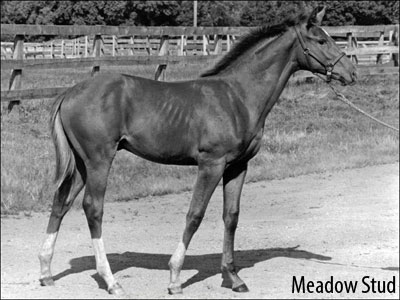
Secretariat as a foal. Courtesy Meadow Stud
